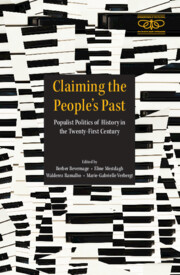Book contents
7 - Populist Islamism in East Africa: Elaborating Alternative Futures from Idealized Pasts
Published online by Cambridge University Press: 15 May 2024
Summary
Introduction
Political Islamism and Islamic reform in East Africa have many strands, but their most salient forms can legitimately be described as populist since they position Muslims in East Africa as ‘little people’ marginalized by a Christian establishment and rhetorically use this opposition for political mobilization (Becker 2006; Loimeier 2011; Mudde 2017). It is also evident that history matters to these populists since they have much to say about historical events. It is harder to decide whether this form of populism should be seen as right-wing or left-wing since it combines calls for economic justice with pronounced gendered inequality and extols political emancipation while remaining vague on its desired political dispensation (Becker 2016; Kresse 2007; Willis and Gona 2013). Moreover, the collective of marginalized Muslim ‘little people’ is internally highly diverse in its religious practices, cultural affiliations, and political views.
This chapter uses a mixture of interviews, sermon recordings, informal conversations, and participant observation to explore how Islamists define a place for Muslims in East Africa's difficult present using claims about the past, historical change, and the future. It examines claims about past greatness and present decline, the dangers and promises of the afterlife, and the difficulty of making futures in this world. While a sense of present hardship and loss of direction is practically omnipresent in this discourse, it contains diverse and sometimes contradictory tropes that different adherents combine flexibly. A distinctive feature is the attention to the domestic realm and gender relations as a site of struggle to live a good life.
This case study, then, seeks to complicate the notion that the appeal of populism lies in its ability to simplify societal problems, which sometimes comes close to suggesting that populism appeals to the simple-minded. It chimes with studies that emphasize tensions and slippages in religious populists’ claims and strategies (Hadiz 2014, 2016, 2018; Baykan 2019; Peker 2019). Populists do strive to use simple oppositions, but since they operate in a messy world, their attempts to simplify tend to create their own complexities. More fundamentally, the tropes of populism work because they can mean different things to different people; because they are polysemous, an effect that has been observed long before the current wave of populist mobilization (Dubow 1995).
- Type
- Chapter
- Information
- Claiming the People's PastPopulist Politics of History in the Twenty-First Century, pp. 138 - 154Publisher: Cambridge University PressPrint publication year: 2025

